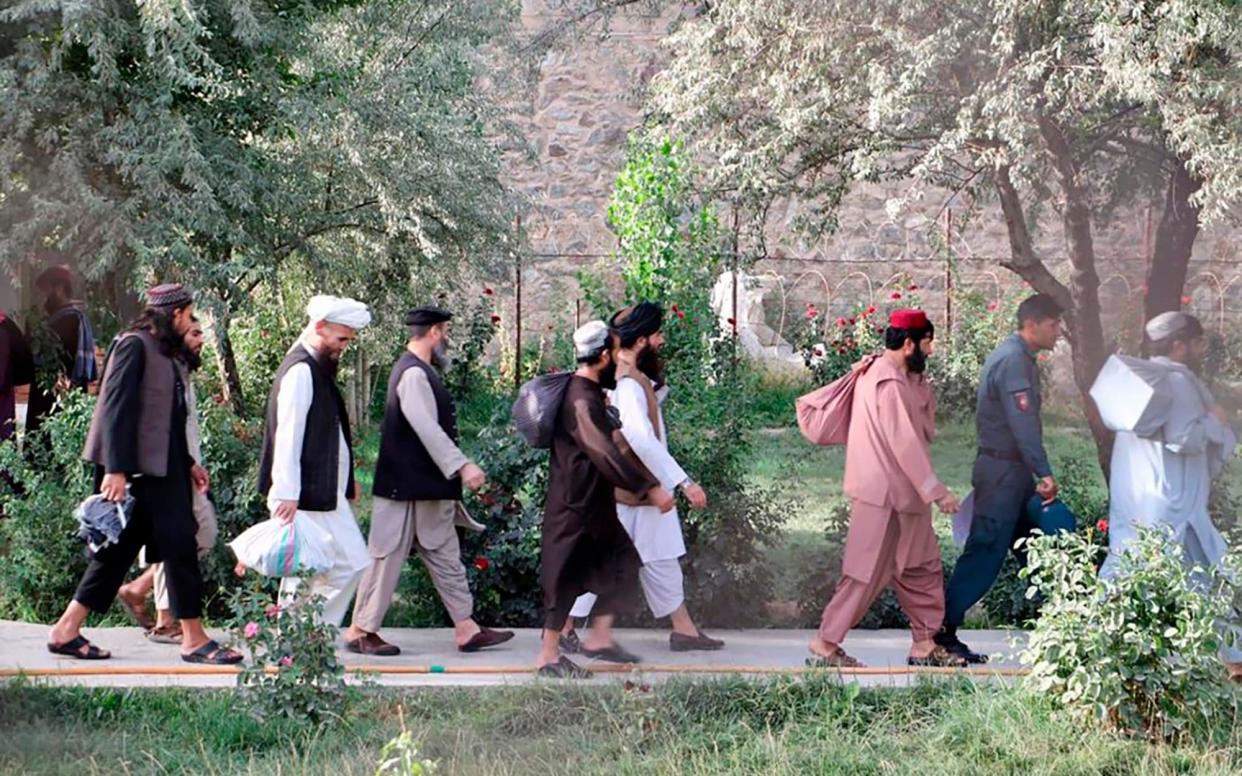Taliban tell French and Australians to keep out of militant prisoner release

The Taliban have rejected Western objections to a prisoner swap of militant fighters who killed international troops, saying Afghanistan's international backers should not interfere.
Plans to free convicted Taliban fighters who killed French and Australian nationals, as part of a trust-building swap to usher in peace talks, have caused anger in Paris and Canberra.
Their objections are reported to have slowed the release of the prisoners by both sides, delaying the start of official talks between the insurgent movement and the Afghan government.
The Taliban's lead negotiator told the Telegraph the French and Australian government should not interfere and accused the Afghan government of using the objections to break the detainee deal.
“France and Australia have no right to interfere in Afghanistan's internal issues,” Sher Mohammed Abas Stanekzai, the Taliban's lead negotiator, told the Telegraph. “These soldiers are our lions.
"These might have killed a few soldiers but the French and Australians killed hundreds of our Afghans. This is just an excuse. We are very serious about prisoners and we call on the USA to release the prisoners as soon as possible”.
February's troop withdrawal deal with Washington outlined the turning loose of 5,000 Taliban fighters in exchange for 1,000 government prisoners.
The swap has recently stalled over the last 320 militants, including some sentenced for notorious suicide bombings and atrocities against Afghan civilians, and a handful accused of killing foreign troops and civilians.
The Taliban has said talks with Kabul to find a political settlement to the conflict will not go ahead until the release is complete.
Those on the list for release are reported to include the killers of Bettina Goislard, a French United Nations worker murdered in 2003, as well as militants involved in the killing of several French soldiers.
The French government has said it “strongly opposes the release of individuals sentenced for crimes against French nationals”.
Another prisoner due for release is a rogue Afghan soldier called Hekmatullah who shot dead three Australian soldiers, L/Cpl Stjepan Milosevic, Spr James Martin and Pte Robert Poate in 2012. Scott Morrison, Australia's prime minister, has said Hekmatullah should never be released.
Three Afghans accused linked to insider attacks on US troops are also reported to be among those up for release, though Washington in its eagerness to push a talks process has not publicly objected.
The UK's Foreign Office has refused to say if any are accused of killing British nationals.
Ashraf Ghani, the Afghan president, earlier this month held a grand council to seek a mandate for the release of the final 400 prisoners. He has said while they still pose a threat, their freedom is the cost of peace. Yet after the approval, the releases halted again amid international objections and an Afghan government demand that 20 army commandos are freed.
Ms Goislard’s family have said news of her killers' release came “like a slap across the face".
Her younger sister, Julie, said the Goislard family asked the Afghan government to spare the lives of Zia Ahmad and Abdul Nabi, after they were sentenced to death in 2004.
“We did that because Bettina was against the death penalty. But we never envisaged that they could be set free. It’s the wheeling and dealing between the Americans and the Taliban that shocks us the most. The memory of the victims is being trampled on for the sake of an agreement. We feel horribly alone since we got this news. I just don’t understand.”
The top peace negotiator for the Afghan government, Abdullah Abdullah, on Thursday said talks between the warring sides would begin in early September, though made no mention of releasing the final prisoners.
Mohammad Hanif Atmar, acting foreign minister, also said major hurdles including the release of prisoners from both sides were not far from resolution. "It seems that most of the hurdles have been either removed or we are in the process of building consensus on a solution. I am cautiously optimistic that this will not be a further hurdle on the way," he said during an online seminar hosted by Washington-based United States Institute of Peace.

